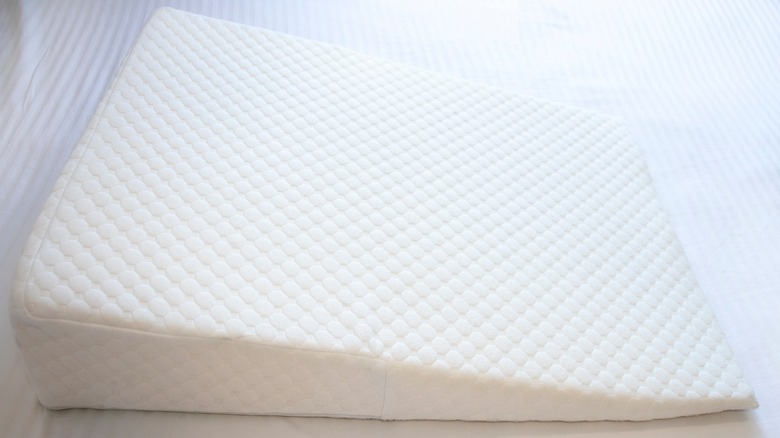Heartburn doesn’t only strike during the day after a hearty meal. In a 2007 interview published in the scientific journal Gastroenterology and Hepatology, William C. Orr, Clinical Professor of Medicine at Oklahoma University Health Sciences Center, explains that of the roughly 14% to 20% of adults across the country who experience heartburn on a weekly basis, approximately three-quarters are affected by nighttime heartburn once a week or more.
Heartburn is one symptom strongly associated with gastroesophageal reflux disease (GERD). GERD is characterized by the continuous backflow of stomach acid back up into the esophagus, a process known as acid reflux (via Mayo Clinic). Because this acid backup can prompt heartburn (via Harvard Health Publishing), those with the condition may experience chest pain, difficulty swallowing, burning sensations in the chest, and more.
Symptoms of GERD can become exacerbated during nighttime hours to additionally include vocal cord inflammation, asthma, or chronic cough. Those with nighttime GERD are also more likely to awaken due to coughing, choking, or sour-tasting regurgitation in the mouth.
Try out a bed wedge

One of the main reasons that symptoms of GERD can rev up while we sleep is because our frequency of swallowing significantly decreases, according to 2024 research published in the Journal of Neurogastroenterology and Motility. Swallowing is one of the ways that our body flushes out refluxate from the esophagus. However, this process is hindered as we snooze. Our sleeping position can further hinder this clearing-out process. Therefore, if you struggle with symptoms of GERD, such as acid reflux or heartburn that kicks in particularly hard at night, changing your sleeping position may help relieve some of the discomfort.
Elevating your torso is a unique sleeping position that may help kick nighttime heartburn to the curb, per Harvard Health Publishing. However, just using any old pillow won’t do. Instead, look into obtaining a bed wedge from a medical supply company. Resembling a cushiony inclined ramp, placing this device underneath you so it supports your torso, head, and shoulders helps alleviate pressure on the lower esophageal sphincter (LES). In turn, this reduces the severity of heartburn as we sleep.
One side is better to sleep on than the other

While a bed wedge can certainly be useful, if you don’t have one at your disposal, research suggests that some of our normal sleeping positions are better than others at relieving nighttime heartburn. In a 2024 study published in The New England Journal of Medicine, researchers monitored 57 heartburn patients over the course of 24 hours and tracked the positions in which they slept. All participants switched between lying on their back, on their right side, and on their left side.
The study findings revealed that while the number of nocturnal reflux episodes did not differ significantly between the three positions, it only took approximately 35 seconds for acid to clear from the esophagus when patients were positioned on their left side. In contrast, this number increased to 76 seconds when patients slept on their back, and 90 seconds when positioned on their right side. The researchers concluded that left-side sleeping may better relieve symptoms of GERD than right-side sleeping. In fact, sleeping on your right side may actually worsen nighttime heartburn due to the fact that your stomach contents are then positioned above where the esophagus connects to the stomach.



